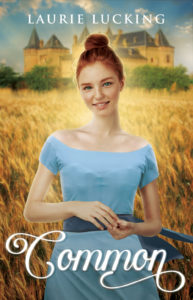Absent Parents in Young Adult Fantasy
For years, we’ve heard about the lack of parents in young adult fantasy, and I just saw another headline last week. Why must so many YA heroes be orphans or disconnected from their parents? Why can’t authors give readers illustrations of loving families? Now that I’m both a parent and an author of YA fantasy, I have a new perspective on the issue.
It’s really as simple (and as challenging) as this: loving, involved parents wouldn’t allow their children to undertake the kind of risks or suffer through the difficult situations these protagonists experience.
I’m going to be honest here. No matter how noble the cause might be, whether he’s the “chosen one” or not, regardless of how much it might contribute toward him becoming a courageous and independent adult, if my son wanted to set out on a quest to save the world or oppose a corrupt government, would I let him go? Absolutely not. At least not alone, and let’s face it—having his or her parents along would significantly undermine the teenager’s role in any story geared toward YA readers.
I also think there’s a secondary force at work. On average (I apologize for the necessity of a broad generalization), a young person growing up without parents or the stability of an “ordinary” family life will likely have a more complex, and therefore more interesting, coming-of-age journey. All teenagers need to strike out on their own, to some extent, to cross the threshold into adulthood. But those who didn’t know their parents, or who for whatever reason never felt a strong sense of self within their childhood home, tend to require more meaningful opportunities to prove themselves in order to gain a sense of identity and appreciate their place in the world.
Does this mean that young adult protagonists must resign themselves to their fates as orphans? To an extent, yes. There’s nothing like putting together the pieces of a young hero’s mysterious heritage to help a character find a new sense of self, and authors will continue to be attracted to that kind of storyline. But in a world where divisions become more pronounced every day, technology puts an increasingly palpable barrier between human connections, and safety restrictions are at a maximum, modern teenagers have plenty of reasons to need to branch out and find their own self-worth, even from the security of a stable home environment.
 And if authors approach the challenge creatively, there are a number of ways to give teen characters a loving family life while still sending them on an unsupervised adventure. The most obvious is to create a necessary separation between the character and his or her family. This can take the form of boarding school, like in the Sentinel trilogy by Jamie Foley; summer camp, as Amy C. Blake used in The Trojan Horse Traitor; or an institution put in place by the government, such as The Hunger Games. In my novel, Common, the main character is separated from her ma when she is banished from the kingdom and her mother can’t accompany her due to poor health. In The Rose and the Wand by E.J. Kitchens, a curse from a magic mirror transports the main character away from her family, forcing her to find her way back. The possibilities are endless!
And if authors approach the challenge creatively, there are a number of ways to give teen characters a loving family life while still sending them on an unsupervised adventure. The most obvious is to create a necessary separation between the character and his or her family. This can take the form of boarding school, like in the Sentinel trilogy by Jamie Foley; summer camp, as Amy C. Blake used in The Trojan Horse Traitor; or an institution put in place by the government, such as The Hunger Games. In my novel, Common, the main character is separated from her ma when she is banished from the kingdom and her mother can’t accompany her due to poor health. In The Rose and the Wand by E.J. Kitchens, a curse from a magic mirror transports the main character away from her family, forcing her to find her way back. The possibilities are endless!
But there are other alternatives, as well. In Spark by J.M. Hackman and The Tethered World by Heather L.L. Fitzgerald, each heroine embarks on her quest in order to save a parent in danger. Or the parents could be fighting for the same cause as the teen protagonist but in a different way, as illustrated by the Weasley family in the Harry Potter series.
So here’s to authors who manage to give their characters warm family environments, while also finagling enough independence to allow them to go on an adventure worthy of immortalization in a book! But let’s also cut some slack to the authors who produce the orphans of the literary world. In the end, what we all want most for our characters is a great story, which often means depriving them of many of our most cherished comforts in life—safety, freedom, or even parents—in order to achieve it.
 An avid reader practically since birth, Laurie Lucking discovered her passion for writing after leaving her career as an attorney to become a stay-at-home mom. When she gets a break from playing superheroes and driving windup cars, she writes young adult fantasy with a strong thread of fairy tale romance. Her debut novel, Common, released in February from Love2ReadLove2Write Publishing, and her short story, “Threshold,” was published in a Fellowship of Fantasy anthology titled Mythical Doorways. Laurie is the Secretary of her local ACFW chapter and a co-founder of Lands Uncharted, a blog for fans of clean young adult speculative fiction. A Midwestern girl through and through, she currently lives in Minnesota with her husband and two young sons. Find out more by visiting Laurie’s social media sites:
An avid reader practically since birth, Laurie Lucking discovered her passion for writing after leaving her career as an attorney to become a stay-at-home mom. When she gets a break from playing superheroes and driving windup cars, she writes young adult fantasy with a strong thread of fairy tale romance. Her debut novel, Common, released in February from Love2ReadLove2Write Publishing, and her short story, “Threshold,” was published in a Fellowship of Fantasy anthology titled Mythical Doorways. Laurie is the Secretary of her local ACFW chapter and a co-founder of Lands Uncharted, a blog for fans of clean young adult speculative fiction. A Midwestern girl through and through, she currently lives in Minnesota with her husband and two young sons. Find out more by visiting Laurie’s social media sites:
Website
Blog
Amazon
Readers’ Group
Facebook
Twitter
Instagram
Goodreads
Pinterest









































Great article! I’m so glad to see these points being made about storytelling and character arcs, because that really is at the heart of it. And it’s not just a modern development — think of all the fairy tales and classic (as in Victorian and Edwardian) children’s books that feature orphans or kids with absent or neglectful parents as well.
Thank you so much for stopping by, R.J., I’m glad you enjoyed the article! You’re so right, absent parents in stories isn’t a new phenomenon at all – orphans have been highly featured in literature for hundreds of years!
Yes, the presence of parents do often create problems in coming of age stories. Because you’re right — no good parent is going to allow their child to take crazy risks! Oftentimes, the MC is given a mentor to provide a moral compass as they find their place (i.e., Dumbledore). Thanks for sharing (& the mention!)
Thanks, Jill! And you’re very welcome!! That’s a great point that often a mentor takes that place of a role model and guide in the absence of parents. Someone who can provide that perspective without having the authority to tell the main character she’s not allowed to go on the scary adventure 🙂
A lot of this also depends on the age of the hero/heroine in question, as well as the setting of the novel. Because in earlier times, people often had to deal with more responsibility at a younger age than they do now. Fantasy novels set in other worlds often hark back to those times. So a 15 or 16-year-old in a fantasy world could very well be doing a lot more than a real-world teen would be allowed to do, because their parents and society already see them as adults. There could be dramatic tension around the child growing into an adult role.
Other ways of getting around this are: The adventurous kid who sneaks off and gets involved in the plot without parental permission. (Most recent one I’ve read and enjoyed: the 1st 2 of David Weber’s Stephanie Harrington novels.)
The whole family has superpowers, and they have to work together to stop the villain. (The Incredibles. In literature, the Abhorsen series.)
Similar to the boarding school example: Parents send kids somewhere safe, adventure ensues. (Narnia, also Alan Garner’s The Weirdstone of Brisingamen ).
Parents send kid somwhere they think is safe, kid makes his own adventure (Lois Bujold’s The Warrior’s Apprentice. Though that’s pushing it a bit since he’s 17.)
Adventures happen, but due to the kid’s powers, he’s the only one of his family who can really know what’s going on (The Dark is Rising.)
With The Hunger Games, Katniss was also already estranged from her mother due to the latter’s depression following her father’s death, (and due to her having to support her family, she was also very self-reliant.)
So to sum up a long rambling post, whether the protagonist has parents around, and what their relationship is like depends very much on the kind of story you want to tell.
Thank you so much for stopping by, these are great thoughts! You’re right that in the past teenagers were often treated more like adults, which is an advantage to many authors writing YA fantasy in historical settings. I have to admit as a parent I don’t personally like the idea of the kid running off without permission, but it can make for a great story! I haven’t read The Dark is Rising, but now I’m intrigued! And you’re right that Katniss was estranged from her mother in The Hunger Games, but that event also pulled children away from families that were much more closely-knit. I love your summary – in the end it really depends on what story the author wants to tell!
True, other tributes had better relationships with their parents (Like Rue, for instance).
In the Stephanie Harrington example, she did get grounded for sneaking out. And while she does move into a role with more responsibility, she also has good relationships not only with her parents, but with other supportive adults as well. So as the story goes on, there’s a nice balance between Stephanie (and other teens) with important jobs, who still have sympathetic adults to help them when they need it. (And she also has a bond with an alien cat who is extremely protective of her, so he lessens the danger as well.)
People probably forget how much setting plays a part in this. If someone is writing a book that takes place in ancient times, or in a warsome, plague filled era, etc. then there’s bound to be lots of orphans and perhaps disfunctional families. And in those situations, even if a person has two loving parents, there may not be any choice except for the child to take on an enormous amount of responsibility and danger at a young age. So, even if the orphan thing is a trope, it’s a trope that can make sense and even be necessary for realism.
One way to approach all this is to make fighting and danger a part of the culture. If the children have to learn to fight from a young age, then it may be a normal part of their school routine, etc. to go off and have adventures separate from their parents. Naruto and Naruto Shippuden are great examples of this. Many of the chars are orphans suffering under hard conditions, but many others did have loving supportive parents that show up and influence the plot heavily. Even so, their children are off adventuring for most of the plot, since in their culture it is normal for children to graduate the ninja Academy at the age of twelve and start going on missions. Having this as a culture is actually very fascinating in this story, especially when we learn how the ninja villages got started and such. (Before the villages got started, the world was so full of war that children were forced to fight and die even at ages as young as 8, so being able to enjoy their childhood for the first 12 years before being sent on missions is a vast improvement in the quality of their life) This story does a good job of subtly questioning and exploring the effects of children having to fight so early, though, unlike the average kid show that has young protagonists fighting the bad guys merely to appeal to their young target audience. So maybe in a way it helps when the author actually acknowledges and explores why children are going on these dangerous adventures instead of it just being there for no reason.
Thank you so much for your comments, Autumn! You’re right that setting plays a huge role, and that some societies naturally had a large number of orphans due to living conditions, disease, or other forces. I’m not familiar with Naruto, but it sounds fascinating! I love the idea of exploring the ramifications of a culture in which children are encouraged to go off and fight at a young age – what a perfect way to write for a younger audience while adding deeper meaning!
Yep 🙂 Naruto seems silly at first, and there’s parts of it that aren’t so great, but stick with it and it becomes a truly amazing and deep show.
I’ve noticed this too. I even saw some people complaining and thinking that the lack of parents was some liberal agenda. (These complaints come from people who don’t know anything about writing.) It takes quite a bit of creativity to have kids with parents that are still alive and decent.
I did a blog post on this a while back, then I mentioned creative ways writers get around the parent problem, such as kidnapping them, making them villains, or having them play a role.
https://jessilroberts.wordpress.com/2016/01/18/the-absent-parent/
Now that I think about it, the Lion Boy Trilogy by Zizou Corder did a decent job of including the parents. Both of them were fun chars and from what I recall, actually made efforts to get back to their son and were even the ones having to save him at one point. Have you ever read that series?
Interesting! I’m not familiar with the Lion Boy Trilogy, but I’ll have to check it out!
Autumn, I actually read the second book of that series, but not the first or third. (Library issues.)
Thank you so much for your comment, Jessi! It does take a lot of creativity to write kids that have present, loving parents, which I think is the culprit much more often than a liberal agenda 🙂 I checked out your blog post and really enjoyed it – I hadn’t thought of the villain option!
Thanks. The villain option can pretty quickly become overused, I’ll admit. I haven’t ever used it due to that issue.
And then there’s Sharon Hinck’s Restorer/Deliverer series which features a good ‘normal’ family involved with ‘trips’ to a fantasy planet where various members of the family become the fighting heroes, all heading different directions: there’s the middle-aged mother who *is* the Restorer (how rare is that??); her husband who’s a warrior with a secret, and their eldest son who gets dragged into it too.